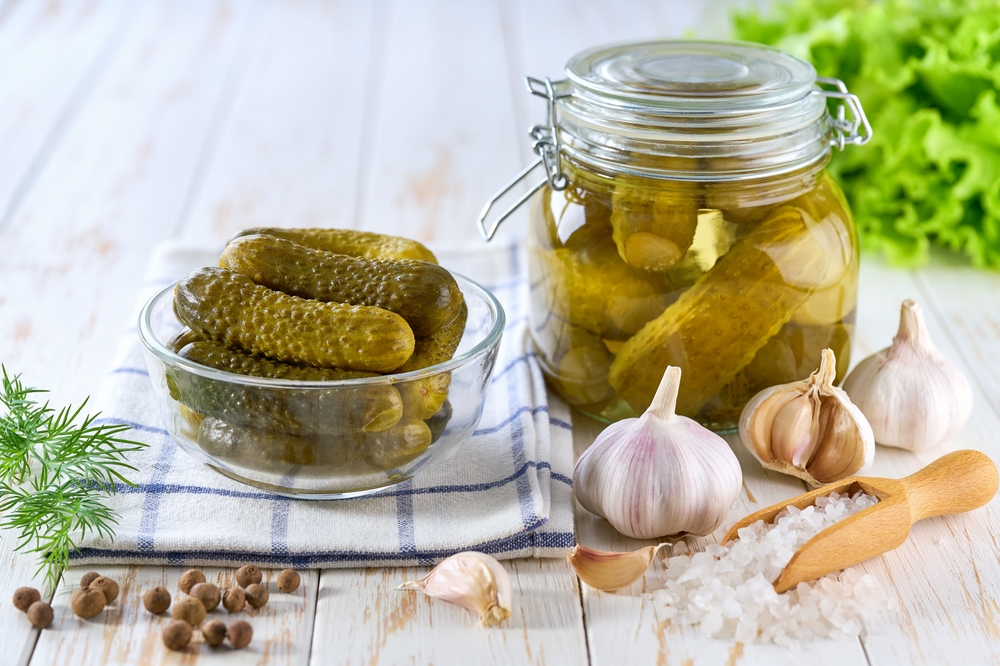Ask Nika Question: I’ve seen pickled gherkins in jars, and recently someone told me about fermented cucumbers – are they the same? What’s so special about fermented vegetables like Polish cucumbers?
Answer: The awareness of the health benefits and amazing flavour of fermented foods is growing steadily in the UK. Many of us have heard of sauerkraut, and kimchi has become a proper culinary star. But all too often, that’s where the journey ends—and unfortunately, fermented vegetables are still frequently confused with pickled ones.
Let’s set the record straight.
🥒 Pickled vs. Fermented – What’s the Difference?

Pickled vegetables, like the ones you find in jars at supermarkets, are typically preserved in vinegar. This method, known as pickling, relies on the acidity of vinegar (often with sugar and spices) to preserve the food and give it a sharp, tangy taste. These products are delicious and shelf-stable, but they do not contain live cultures or the probiotic benefits associated with fermentation.
Fermentation, on the other hand, is a completely different process. It involves placing vegetables in a salty brine and letting natural bacteria—mainly Lactobacillus—break down the sugars. This produces lactic acid, which preserves the food and gives it a sour, complex flavour. Traditionally, fermentation was used to extend the shelf life of vegetables during the winter months. Later, we discovered something even more valuable: fermented foods are genuinely good for us.
🇵🇱 A Polish Staple: Fermented Cucumbers
I come from Poland, where fermented foods like sauerkraut and ogórki kiszone (naturally fermented cucumbers) are everyday staples. We use sauerkraut in many dishes—like kapuśniak (cabbage soup), kwaśnica (highland-style sauerkraut soup), or bigos (a slow-cooked hunter’s stew). As for fermented cucumbers, we eat them with just about everything (well, maybe not with cake 😉).
They’re especially great:
· With warm meals as a tangy side dish
· Diced into sandwiches for a crunchy punch
· In salads—particularly potato salad, where they add brightness and a slight acidity that balances the richness of the mayo and potatoes
🛒 Where to Find Them in the UK

Sadly, real fermented cucumbers are hard to come by in mainstream shops. You’ll find them mostly in Polish delis, on “Polish shelves” in larger supermarkets like Tesco or ASDA, or from online retailers. But the good news? They’re easy to make at home!
🥣 How to Make Traditional Polish Fermented Cucumbers (Ogórki Kiszone)
You’ll need:
· 1 kg small cucumbers (firm and unwaxed)
· 1 litre of water
· 1 tablespoon salt (non-iodised, like rock or sea salt)
· A few cloves of garlic
· A few sprigs of fresh dill (ideally with flowers)
· Optional: horseradish root, mustard seeds, or a bay leaf
Instructions:
1. Dissolve the salt in water to make a brine.
2. Wash the cucumbers well and pack them tightly into a sterilised jar.
3. Add garlic, dill, and any extras you like.
4. Pour the brine over the cucumbers, completely submerging them (you can weigh them down with a clean stone or small plate).
5. Cover loosely (not airtight), and leave at room temperature for 3–5 days. Taste daily—when they reach your preferred level of sourness, move them to the fridge to slow fermentation.
They’ll keep for weeks and develop even more flavour over time!
🌿 Why You Should Include Fermented Foods in Your Diet
Like other fermented vegetables, fermented cucumbers are a natural source of probiotics—live bacteria that help support a healthy gut. A balanced gut microbiome is linked to:
· Better digestion
· Stronger immune function
· Reduced inflammation
· Even improved mood and mental clarity
Plus, fermentation makes certain nutrients more bioavailable, and these cucumbers contain vitamin K, antioxidants, and natural enzymes that support your overall well-being.
In short? Real fermented vegetables are more than just a tasty old-world tradition—they’re a living, tangy boost for your health. Whether you buy or make them at home, fermented vegetables deserve a regular spot on your plate.
Got questions about food, nutrition, or how to bring traditional goodness into your everyday life? Ask Nika – I’ll help you make sense of it all, one delicious bite at a time.
